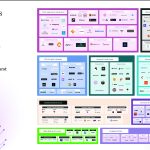
In the modern era, artificial intelligence (AI) is no longer a futuristic concept but a transformative force shaping industries worldwide. Businesses across various sectors are leveraging artificial intelligence development services to enhance efficiency, improve customer experience, and gain competitive advantages. This article delves deep into the pivotal role AI development plays in modern businesses, exploring its applications, benefits, challenges, and future prospects.
What is Artificial Intelligence?
Artificial intelligence refers to the simulation of human intelligence in machines designed to think, learn, and make decisions. AI technologies include machine learning (ML), natural language processing (NLP), computer vision, robotics, and more. These technologies empower systems to analyze data, recognize patterns, and perform tasks that typically require human cognition.
Key Roles of AI in Modern Businesses
1. Automation of Repetitive Tasks
AI-powered automation is revolutionizing workflows by eliminating manual tasks. Repetitive operations such as data entry, invoice processing, and inventory management are now managed by AI systems, freeing up human resources for more strategic activities.
For example:
- Robotic Process Automation (RPA): Tools like UiPath and Automation Anywhere automate business processes with precision.
- Customer Support: AI chatbots handle common customer queries, allowing support teams to focus on complex issues.
2. Data-Driven Decision Making
AI enables businesses to make informed decisions based on real-time and historical data analysis. Advanced analytics tools powered by AI help identify trends, forecast outcomes, and offer actionable insights.
Examples include:
- Predictive Analytics: AI predicts customer behavior, helping businesses optimize marketing campaigns.
- Business Intelligence (BI): Platforms like Tableau and Power BI integrate AI for deeper data insights.
3. Enhanced Customer Experience
Modern consumers expect personalized experiences, and AI delivers just that. From tailored product recommendations to chatbots that provide instant assistance, AI ensures a seamless customer journey.
Examples include:
- Recommendation Engines: E-commerce giants like Amazon use AI to suggest products based on user behavior.
- Virtual Assistants: Tools like Siri, Alexa, and Google Assistant enhance user interaction.
4. Improved Operational Efficiency
AI optimizes business processes, reducing costs and boosting productivity. In supply chain management, for instance, AI predicts demand, optimizes routes, and ensures timely deliveries.
Examples include:
- Inventory Management: AI predicts stock requirements, preventing overstocking or shortages.
- Manufacturing: Predictive maintenance uses AI to foresee equipment failures and schedule timely repairs.
5. Enhanced Cybersecurity
With cyber threats on the rise, businesses are turning to AI for robust security solutions. AI detects unusual activity and identifies vulnerabilities, offering a proactive approach to cybersecurity.
Examples include:
- Threat Detection: AI systems analyze network traffic to spot potential breaches.
- Fraud Prevention: Financial institutions use AI to detect suspicious transactions in real-time.
AI Applications Across Industries
1. Healthcare
AI is transforming healthcare by improving diagnostics, personalizing treatment plans, and streamlining operations.
Examples:
- AI-driven diagnostic tools like IBM Watson Health analyze medical data to assist doctors.
- Chatbots provide patients with medical advice and appointment scheduling.
2. Retail and E-commerce
AI helps retailers understand customer preferences, optimize pricing strategies, and improve inventory management.
Examples:
- AI-powered visual search allows customers to find products using images.
- Dynamic pricing adjusts prices in real-time based on demand and competition.
3. Financial Services
From risk assessment to fraud detection, AI is indispensable in finance.
Examples:
- Chatbots like Erica by Bank of America assist customers with financial queries.
- AI algorithms analyze creditworthiness for faster loan approvals.
4. Manufacturing
AI optimizes production processes and improves quality control.
Examples:
- AI-driven robotics automate assembly lines with precision.
- Computer vision detects defects in products during quality checks.
5. Transportation and Logistics
AI enhances route optimization, fleet management, and supply chain efficiency.
Examples:
- Autonomous vehicles like Tesla rely on AI for navigation.
- AI-driven logistics platforms like Convoy optimize freight movement.
Benefits of AI in Business
- Increased Efficiency
AI reduces human effort, speeding up processes and minimizing errors. - Cost Savings
Automation leads to significant cost reductions in operations. - Scalability
AI systems handle large-scale operations effortlessly, allowing businesses to grow. - Personalization
Businesses can offer hyper-personalized products and services using AI insights. - Competitive Advantage
Early adopters of AI enjoy a significant edge over competitors.
Challenges of AI Implementation
While AI offers immense benefits, its adoption is not without challenges:
- High Initial Investment
Developing and deploying AI solutions require substantial resources. - Data Privacy Concerns
Handling sensitive customer data raises ethical and legal questions. - Skill Gap
There’s a shortage of professionals skilled in AI technologies. - Integration Issues
Integrating AI into legacy systems can be complex and time-consuming. - Bias in AI Algorithms
AI models can inadvertently reflect biases present in training data.
Future of AI in Businesses
The future of AI in business is promising, with innovations like generative AI, autonomous systems, and quantum computing on the horizon. Businesses will increasingly rely on AI to navigate complexities, drive innovation, and achieve sustainability goals.
Emerging Trends:
- Generative AI
Tools like ChatGPT and DALL-E are changing the content creation landscape. - Explainable AI
Ensures AI decisions are transparent and understandable. - AI in Sustainability
AI helps optimize resource usage and reduce carbon footprints.
How to Get Started with AI in Your Business
To harness the power of AI, businesses must take a strategic approach:
- Identify Use Cases
Pinpoint areas where AI can add the most value. - Invest in Talent
Hire or train employees in AI technologies. - Choose the Right Tools
Select AI solutions that align with your business needs. - Start Small
Begin with pilot projects to measure AI’s impact before scaling up. - Collaborate with Experts
Partner with AI development companies for seamless integration.
Summing up
Artificial intelligence is reshaping the business landscape, offering unprecedented opportunities for innovation and growth. From automating tasks to enhancing customer experiences, AI’s impact is profound and far-reaching. As businesses continue to embrace AI, those that strategically invest in its development will lead the way in this new era of digital transformation.
By leveraging AI effectively, modern businesses can not only streamline operations but also create value that drives long-term success. The journey of integrating AI may have its challenges, but the rewards far outweigh the effort, making it an essential tool for businesses aiming to thrive in the competitive market.












